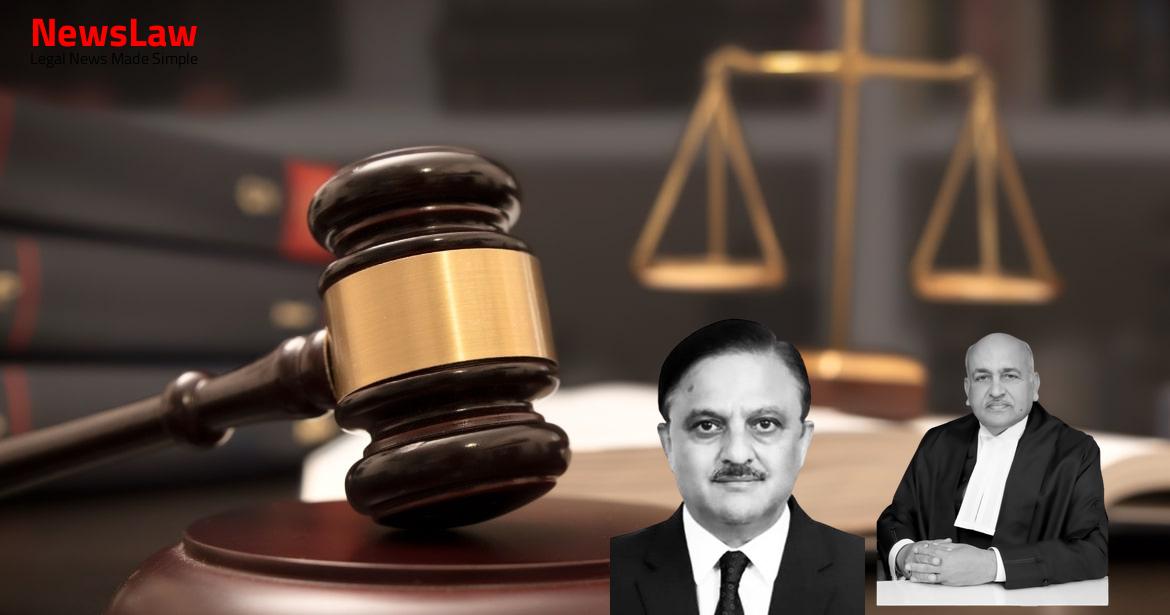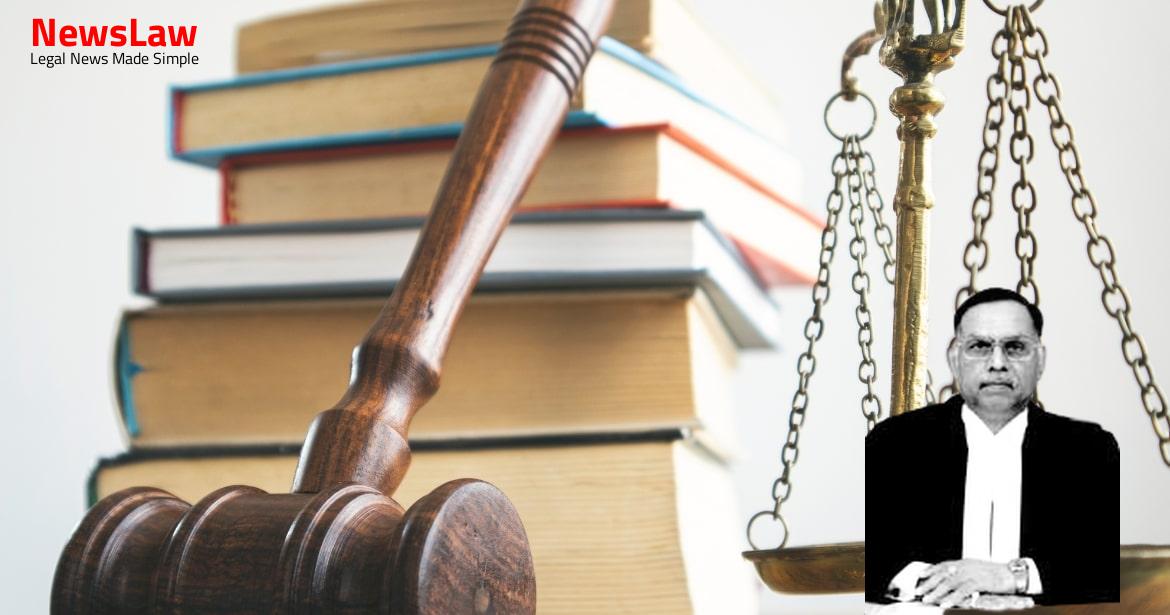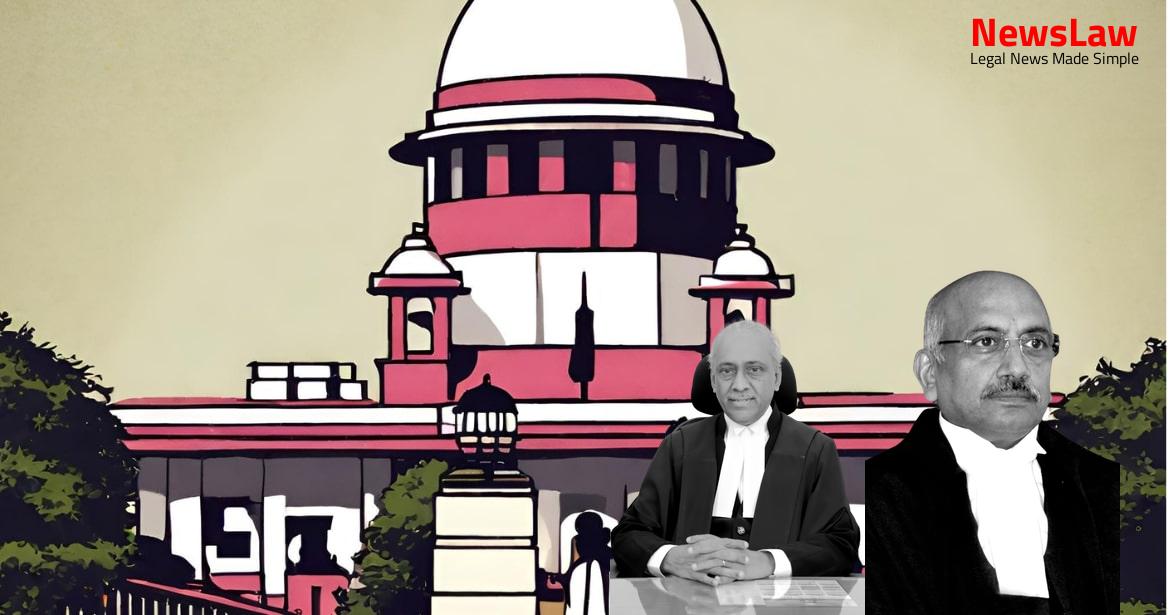In a significant legal battle, the Supreme Court delivered a judgment in the case of National Highways Authority of India v. M/s. ITD Cementation India Limited. The court considered the respondent’s claims and the petitioner’s arguments, ultimately upholding the Arbitral Tribunal’s decision. The case revolved around the interpretation of contract terms, additional costs, and the application of the Arbitration Act. Stay tuned for a detailed analysis of the implications of this landmark judgment.
Facts
- The Arbitral Tribunal granted an amount of Rs.2,69,91,248/- as an additional cost to the National Highways Authority of India Ltd. till 31st December 2008.
- The award includes interest and future interest of 12% per annum.
- For Claim no.3, the National Highways Authority of India Ltd. was granted Rs.3,77,74,427.39/- along with interest and future interest at 12% per annum.
- An appeal was filed under Section 37 of the Arbitration Act before the Delhi High Court by the appellant.
- Regarding Claim no.2, the learned Single Judge upheld the award which granted Rs. 3,47,35,522/- to the respondent for the embankment formation.
- The award for Claim no.2 was a majority decision with two members of the Arbitral Tribunal in favor and one dissenting.
- The Division Bench of the Delhi High Court confirmed the award for Claim no.2 along with Claim no.1 and Claim no.3.
- The appellant was directed to pay additional costs post-31st December 2008 due to increased royalty charges and sales tax.
- The judgment relied on the case of National Highways Authority of India v. M/s. ITD Cementation India Limited for upholding the award.
Also Read: Analysis of Criminal Appeal No. 1637 of 2021: Alauddin & Ors. vs. The State of Assam & Anr.
Arguments
- Contract provides for partly fixed and partly adjustable prices.
- Challenge in present appeal based on previous decision in National Highways Authority of India v. M/s. ITD Cementation India Limited.
- Additional costs covered in Clause 70.3 (vii) of the agreement.
- Judgment partly allowed on claim no.8 in a previous appeal.
- Price adjustment based on Wholesale Price Index (WPI) as per sub-clause 70.3 (vii) of the contract.
- Disagreement on interpretation of clause 70.8 of the agreement.
- Strict interpretation of the contract required by Arbitral Tribunal and Courts.
- Additional or reduced costs not separately paid if already considered in price adjustment.
- Issues in present appeal: Increase in royalty, sales tax, forest transit fee; claim for balance amount for construction of embankment.
- Imposition or upward revision of tax through subsequent legislation akin to additional royalty.
- Topsoil removal for construction considered part of clearing and grubbing.
- The learned counsel representing the respondents emphasized on the narrow scope of interference in a petition under Section 34 of the Arbitration Act and the even narrower jurisdiction of the Appellate Court under Section 37.
- They referred to a judgment of the Delhi High Court in the case of National Highways Authority of India v. M/s. ITD Cementation India Limited, which was upheld by the Supreme Court in Civil Appeal no. 9799 of 2010 and related cases.
- The counsel argued that the Supreme Court’s decision completely covers the respondents’ claims numbered 1 and 3.
- They highlighted the majority view of the Arbitral Tribunal regarding expenses incurred for making an embankment, stating that the appellant is not liable under clause 70.8 of the agreement just because the respondent has incurred some expenditure.
- The counsel defended the majority view as that of experts and not necessitating interference, backing their argument with the factual aspects of related cases.
Also Read: Parsi Dairy Farm vs. Local Tribals – Supreme Court Judgement
Analysis
- The Division Bench considered the findings of the two members of the Arbitral Tribunal and noted the dissenting opinion of the third member.
- The WPI is an index applicable uniformly in all states, while the increase in Seigniorage Fee would vary from state to state.
- The Arbitral Tribunal has the authority to adjudicate on the construction of the terms of a contract.
- The view taken by the Arbitrator on facts must pass muster as the ultimate master of the quantity and quality of evidence relied upon in delivering the arbitral award.
- The High Court observed the real controversy regarding the work of backfilling and its exclusion from the embankment construction work.
- The award also considered whether minor minerals were included in the cost variation while arriving at WPI.
- The Division Bench correctly upheld the majority opinion of technical persons without subjecting it to a relook.
- The Arbitral Tribunal’s interpretation of the terms of the contract was consistent with the principles laid down by the Court.
- The construction of the terms of the contract by the Arbitral Tribunal was acceptable based on the material on record.
- The Division Bench concluded that the applicable sales tax increased from 22% to 25% based on the circular dated 1 December 2004.
- The Arbitral Tribunal’s view on the interpretation of the contract is final, and the Court under Section 34 does not sit in appeal on arbitrator findings.
- Concurrent findings by the Arbitral Tribunal, the learned Single Judge, and the Division Bench were in favor of upholding the Arbitral Tribunal’s interpretation of the contract.
- The impact of clauses 70.1 to 70.7 and 70.8 were considered in the award, distinguishing between cost escalation based on price adjustment formulae and additional costs from subsequent legislation.
- The High Court noted the appellant sought deductions after initially paying amounts for the embankment work.
- The construction of the terms of a contract is primarily for an Arbitrator to decide unless the Arbitrator’s construction is so unreasonable that no fair-minded person would do.
- When applying the ‘public policy’ test to an arbitration award, the court does not act as a court of appeal and cannot interfere on factual errors.
- Violation of Indian public policy includes a violation of Indian law’s fundamental policy, interest of India, conflict with justice or morality, and patent illegality in the arbitral award.
- The ‘fundamental policy of Indian law’ covers compliance with statutes and judicial precedents, natural justice principles, and the principle of ‘Wednesbury reasonableness’.
- Patent illegality refers to contravention of substantive Indian law, the 1996 Act, and contract terms.
- The jurisdiction of the Court under Section 34 to interfere with the arbitral award is narrow, and the appellate Court’s jurisdiction under Section 37 of the Arbitration Act is even more limited.
- An Arbitral Tribunal must decide in accordance with the contract terms, and a reasonable construction by the Arbitrator does not warrant setting aside the award.
- The views on interference in arbitration awards were reiterated in cases like NHAI v. ITD Cementation (India) Ltd. and SAIL v. Gupta Brother Steel Tubes Ltd.
- The challenge to the award was examined within the limitations of Sections 34 and 37 of the Arbitration Act by the Single Judge and Division Bench of the High Court.
- The view of the Arbitral Tribunal, Single Judge, and Division Bench was deemed sound and not faulted.
- No perversity or illegality was found in the decisions made by the Tribunal, Single Judge, and Division Bench.
Also Read: Jindal Drugs Limited vs. Revenue Department: Labelling Activity as Manufacture
Decision
- No merit found in the appeals
- Appeals dismissed
- No order as to costs
Case Title: NATIONAL HIGHWAYS AUTHORITY OF INDIA THROUGH PROJECT DIRECTOR Vs. M/S HINDUSTAN CONSTRUCTION COMPANY LTD.THROUGH ITS DIRECTOR (2024 INSC 388)
Case Number: C.A. No.-004702-004702 – 2023



